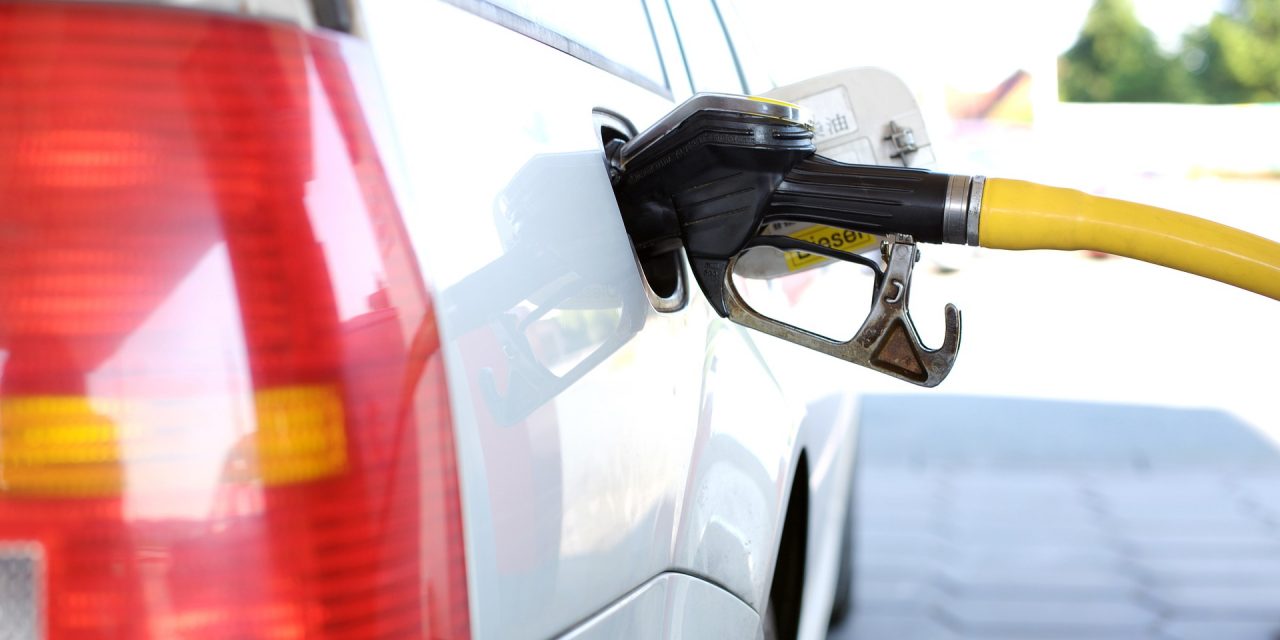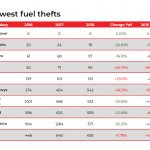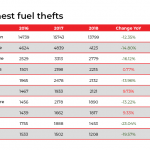- Over 25,000 confirmed fuel thefts nationally in 2018…
- …but the nationwide figure could be as high as 99,000 fuel thefts in 2018
- As much as £9 million worth of fuels could have been stolen across the UK in 2018
A recent Freedom of Information (FOI) request has revealed that fuel theft is an all-too-common occurrence in the UK.
Crown Oil, who issued the FOI, discovered that there were at least 25,614 confirmed fuel thefts in 2018, equating to over £1.75m lost to business and domestic users. Taking into account the constabularies that did not provide data, that number could rise to over £9m each year.
Meanwhile, British Oil Security Syndicate suggests that forecourt theft alone could be as high as £30 million.1
Fuel theft can include petrol and diesel being stolen from vehicles, other fuels including coal, paraffin, kerosene and gas being taken from storage tanks on commercial premises. However; the largest single contributor to this number was drivers leaving without payment from a fuel station.
Matt Greensmith, Managing Director of Crown Oil, commented:
“These findings confirm our suspicions: fuel theft occurs far too often across the country and costs businesses and individuals alike millions of pounds a year, whilst the nature of the crime often means a reported theft will go unpunished.”
“As a fuel supplier that often supplies emergency fuel following such incidents, we empathise with those who have been victims of fuel theft. For anyone who feels vulnerable we always advise that that prevention is better than cure: improving petrol station security, ensuring fuels are stored in a secure location and implementing fuel management systems will hopefully deter criminals.”
The cost of fuel theft
Only 50% of constabularies contacted responded at the time of writing; however, the data received paints a damning picture.
Data from London’s Metropolitan Police revealed that the value of fuel stolen equalled £1,113,074.98 in 2018, with 22 of the remaining 45 constabularies around the UK reporting an additional £638,217 worth of fuels stolen – totalling a staggering £1.75 million pounds of fuel stolen in 2018.
The available data also revealed the average value of each theft cost its victim £91.21. Expanding this across the country, the estimated total figure that thefts of fuel cost the UK is £9.0 million, after an estimated 120,000 thefts nationally.
An additional trend seen from data in multiple constabularies is that perhaps petrol stations are the hardest hit by fuel criminals. From the available data, around 80% of thefts were making off without payment and only around 1% of fuel thefts resulted in a prosecution indicating a need for fuel stations to do more to protect themselves.
Key findings
- The data reveals that fuel theft incidents in 2018 saw an 11% drop year on year, although when compared to fuel theft figures in 2016, incidents increased by a third of a per cent nationally.
- The highest increase in fuel theft was in Durham (29% higher year on year).
- The sharpest decrease was in Bedfordshire (55% lower year on year).
- When compared with 2016, Dyfed-Powys police have seen fuel theft reports rise by 98%, from 274 to 542 in 2018.
- The constabulary with the highest number of offences was Greater London, with 13,799 fuel thefts reported – which is more than triple the next highest, in West Yorkshire, with 4,123 reported offences.
- The fewest recorded incidents were in the Port of Dover, with zero reported incidents of fuel theft since 2016.
Have you been struck by a fuel criminal? 4 steps we can take to minimise fuel thefts
- Make petrol stations safer – implement pre-payment pumps, clearer CCTV footage and licence plate recognition at fuel stations
- Commercial properties with fuel stored on-site should invest in more robust fuel storage security and fuel monitoring systems
- Fuel storage tanks can be stored in high visibility and well-lit areas covered by CCTV
- Fuel tanks should be fitted with anti-fuel siphoning devices and fuel-monitoring systems
Appendix – Data Tables
Top 10 lowest fuel thefts
Top 10 highest fuel thefts
The full table can be found on Crown Oil’s blog.
Data integrity
23 of 46 constabularies responded to the FOI request, and data supplied varied from constabulary to constabulary and definition of a ‘fuel theft’ varied as well resulting in a diverse range of report numbers. Incidents of fuel theft are affected by some police services providing partial data.
Where data from police services was unavailable, an estimate was calculated based on the average figures of the available constabularies.
1: https://www.bossuk.co.uk/cost-of-forecourt-crime-jumps-by-more-than-20-during-q3-2018/




















